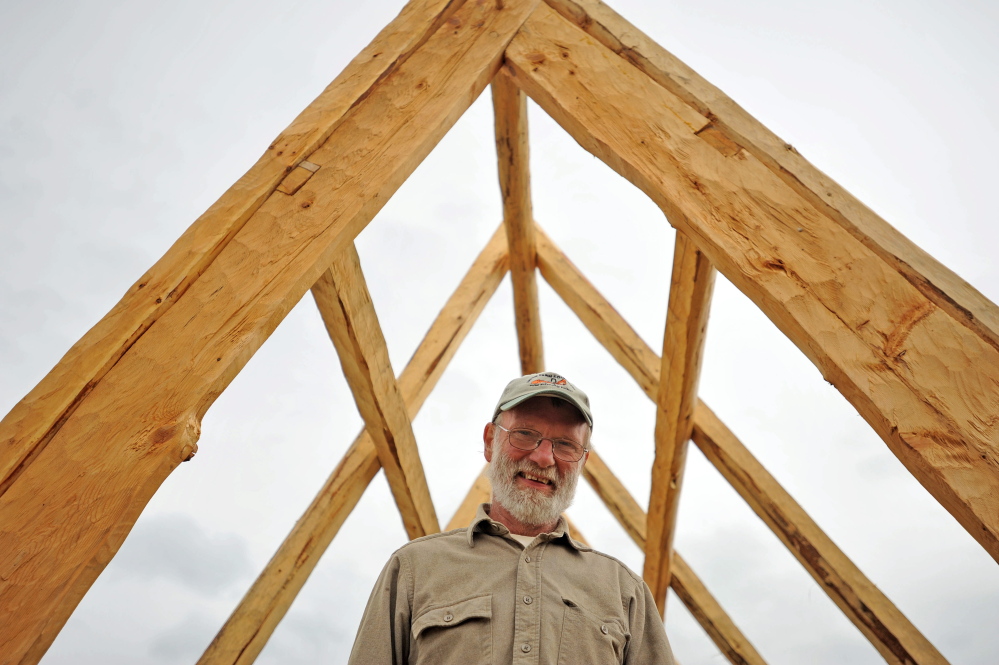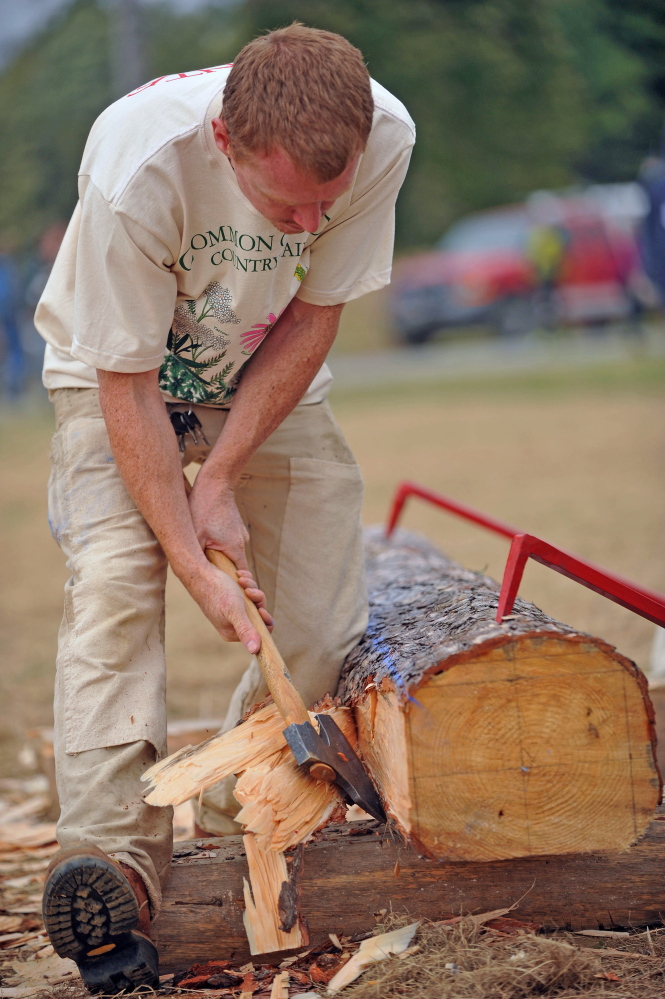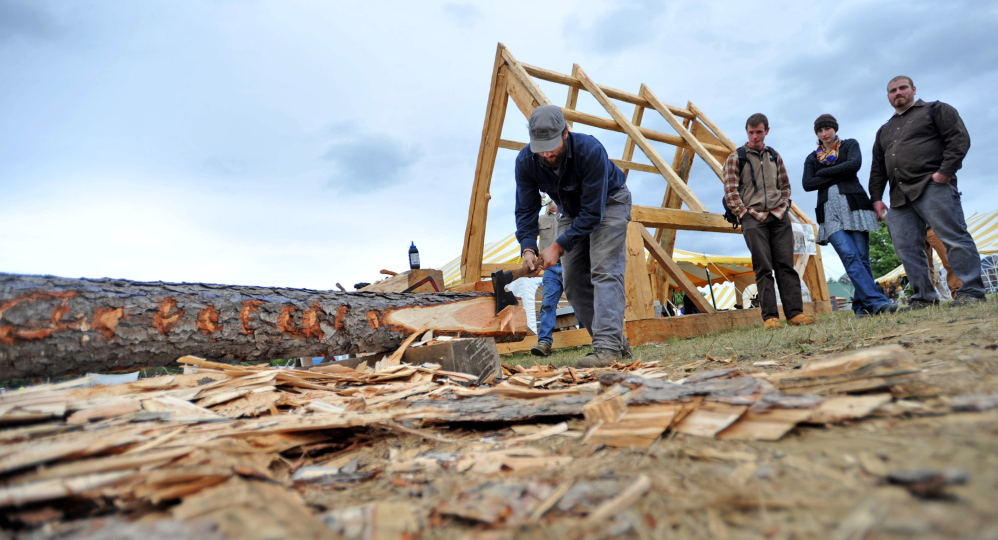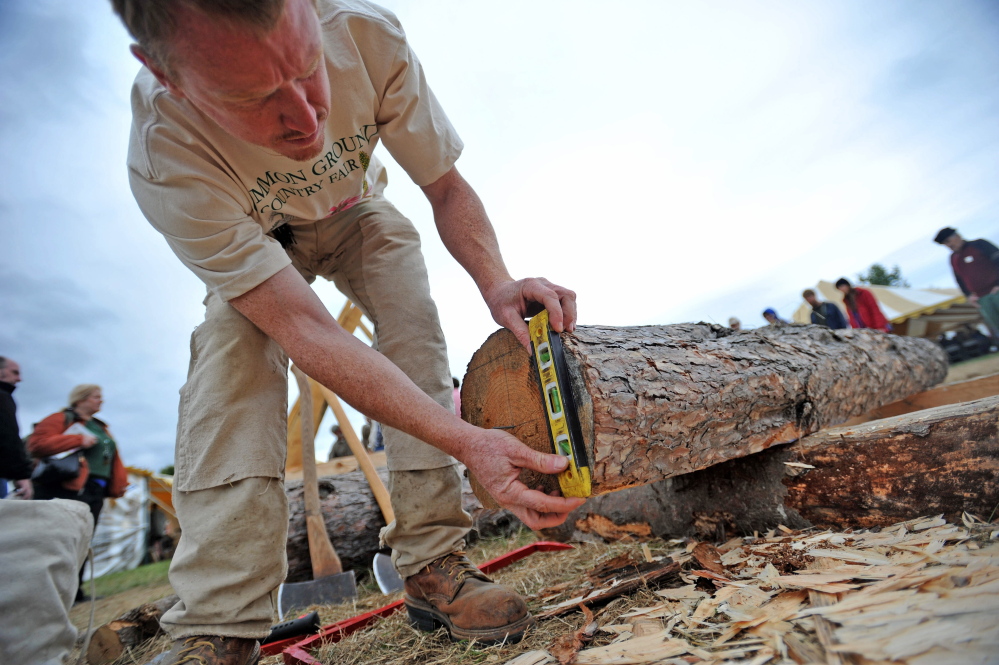UNITY — Deep inside the crossroads of organic food, whole life events, crafts, medicinal herbs, political tents and agricultural demonstrations at the Common Ground Country Fair is Michael Beaudry, a master timber framer who builds log homes, sheds and barns using axes and hand tools, some of which are replicas of 11th century cutting tools.
Beaudry’s work is a bit of history – a look back to a time when buildings were made from round logs hewn with iron axes into flat-sided lumber for building.
The fair itself is 40-plus acres of talks, demonstrations and exhibits focusing on healthy and environmentally sound living.
Even on a somewhat chilly gray day, as was Saturday at the fair – the 38th annual celebration of rural and sustainable living in Maine – the grassy pathways were filled with vendors, demonstrators, entertainers, exhibitors, impromptu singing, drumming, dancing and lots of colorful people.
Lots of people.
The three-day fair in Unity, organized and presented by the Maine Organic Farmers and Gardeners Association, draws about 60,000 people annually. The bumper-to-bumper traffic from Unity Raceway to the fair itself is a testament to the popularity of the event.
In the midst of it all is Beaudry, 61, of Montville, who has been constructing buildings with raw timber since 1977. He’s been demonstrating his expertise at the Common Ground fair for the past 13 years.
“I select the tree. I fell it. I’ll cut it to length. I put it on the cribbing and I’ll hew it right there in the woods,” said Beaudry, who with the help of two other men on Saturday demonstrated what it takes to make lumber by hand. “Then all I have to do is haul out the finished timber, which is a lot lighter than hauling out logs.”
One of the most beautiful fair venues is MOFGA’s Exhibition Hall, which is a post-and-beam structure designed and raised in 1998 by five Maine-based timber frame companies, similar to Beaudry’s. The hall showcases thousands of garden entries organically raised throughout the state.
At the demonstration site Saturday, Beaudry’s assistants – Ryan Brubaker of Liberty and Ethan Higgins of Vermont – showed groups of onlookers how to take whole red pine, hemlock or black cherry logs and score them with the axes to begin forming the beam. The slices are struck into chips, making a rough outline of the future board using a measured chalk line to square it up for hewing, Brubaker said. Finished homes and barns by Beaudry are likely to be 40 percent hand-hewn logs. The rest is done with more modern power tools.
The logs are held in place with handmade steel log dogs – like heavy staples with sharp points at each end – to keep them from rolling.
“We’re making a round log into dimensional timbers for building. We’re taking a round and turning it into a rectangle or a square,” Brubaker said. “The timbers are later fastened together with wood joints – mortise and tenon. It’s all interlocking wood and wooden pegs that hold the wooden joints together to keep it from coming apart.”
Brubaker and Beaudry said they choose from more than a dozen axes, including ancient designs that date back to medieval times.
“This ax would have been in use when William the Conquerer was getting ready to invade England,” Beaudry said, displaying an odd-shaped ax. “They used an ax like this to build the Viking ships,” he said, holding up another heavy steel ax, with a sharp 8-inch head.
Other axes at the demonstration were replicas of tools used in the late 1800s to make rugged sidewalk planks and to carve out railroad ties, as Americans opened up the central Plains on their way west by rail. Another ax Beaudry displayed is a replica of a Bronze Age ax, mounted on a curved piece of wood and secured with rawhide.
The tools can be heavy, he said; but with knowledge and experience, they can be wielded – even by an older man – with ease.
“The more experience you have with axes, the less hard we have to work,” he said. “The less experience, the harder you have to work. There is a rhythm to using the tools.”
The Common Ground Country Fair continues Sunday. Gates open at 9 a.m. The fair ends Sunday at 5 p.m.
Andre Leu, president of the International Federation of Organic Agricultural Movements, is scheduled to speak at 11 a.m. Sunday about his book “The Myths of Safe Pesticides,” which argues that inadequate pesticide regulation is causing numerous human health problems, evidenced by hundreds of scientific studies.
The topic of pesticides is one of high importance to MOFGA, which works to lower toxins in the environment.
Doug Harlow can be contacted at 612-2367 or at:
dharlow@centralmaine.com
Twitter: @Doug_Harlow
Copy the Story LinkSend questions/comments to the editors.








Success. Please wait for the page to reload. If the page does not reload within 5 seconds, please refresh the page.
Enter your email and password to access comments.
Hi, to comment on stories you must . This profile is in addition to your subscription and website login.
Already have a commenting profile? .
Invalid username/password.
Please check your email to confirm and complete your registration.
Only subscribers are eligible to post comments. Please subscribe or login first for digital access. Here’s why.
Use the form below to reset your password. When you've submitted your account email, we will send an email with a reset code.